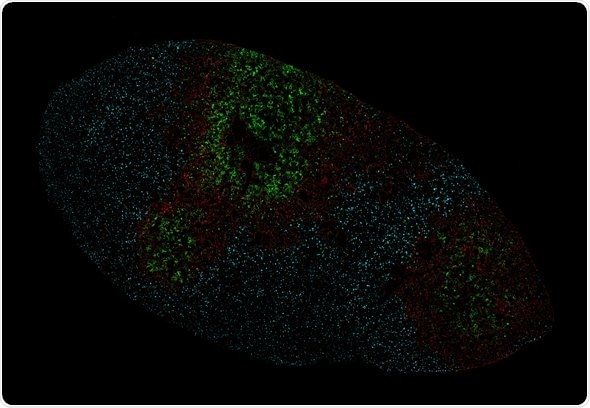Researchers at the Centenary Institute and the University of Sydney have discovered a key reason as to why the influenza virus is so effective at establishing infection and causing damage in the lungs.

Image showing infected cells (marked by green) being constrained by interferon-reactive cells (red-colored) in an influenza exposed mouse lung
They found that a group of lung-cells, following influenza infection, responded only poorly to interferons (the signalling proteins that help defend the body against viral attack). The research could pave the way for the development of new and improved anti-influenza drugs and vaccines, to both improve health and to save lives.
Interferons are critically essential to our defence against pathogens including the influenza virus. The proteins are so named because they ‘interfere’ with the ability of viruses to multiply in the body. It’s been known for a long time that during influenza, lung cells and immune cells in the lungs secrete interferons causing virus-infected cells to initiate anti-viral defences. However, how interferons actually undertake this protective activity is still not understood because the signalling proteins can act on hundreds of different types of cells in our body."
Associate Professor Carl Feng, Senior study author from the Centenary Institute and the University of Sydney
In their study, Associate Professor Feng and colleagues have generated a new tool to identify which cells respond to interferons in influenza infected mice. The goal was to work out whether the outcome of infection and interferon signalling differed between different cell types. What the researchers have demonstrated in the study is that not every cell type reacts equally to the interferons, even when they are in close proximity to each other.
“We were able to show that cells in influenza-infected mice reacted to interferons in dissimilar ways. Most notably, we found that one type of lung cell, the major target of the influenza virus, responded extremely poorly to interferons and were highly vulnerable to viral infection. This was particularly noticeable at the early-stage of the influenza infection cycle,” said Associate Professor Feng.
The research has the potential to lead to the development of new vaccination strategies and therapeutics that are more effective than the currently available anti-influenza drugs.
“Influenza remains among the most significant global infectious diseases owing to its high infectivity, the variable usefulness of current vaccines and the limitations of anti-viral therapy. It’s also a major health burden in Australia and globally,” said the Centenary Institute and University of Sydney’s Professor Warwick Britton, also an author of the study.
A better understanding of how this virus infection is controlled by lung cells can help us to find medical solutions against influenza which results in millions of cases of severe illness and which is responsible for killing up to half a million people each and every year."
Professor Warwick Britton, Centenary Institute and University of Sydney
The investigators plan to study human lung-cells and their response to interferons and the influenza virus as a next-step of the research program.
The study publishes today, 11 December 2019, in the prestigious science journal ‘Cell Reports’.
Source:
Journal reference:
Stifter, S.A., et al. (2019) Visualizing the Selectivity and Dynamics of Interferon Signaling In Vivo. Cell Reports. doi.org/10.1016/j.celrep.2019.11.021.